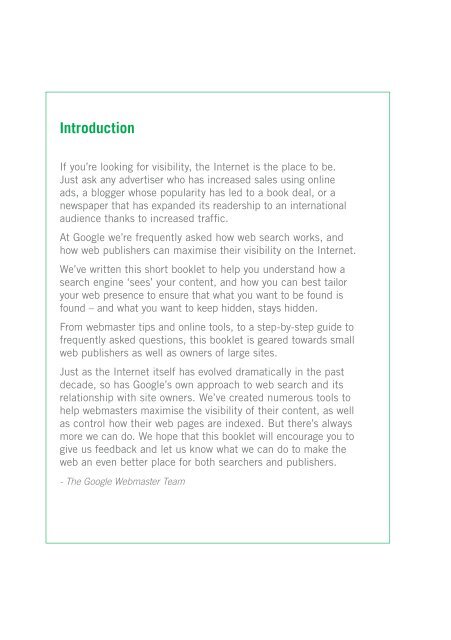Making the Most of Your Content - A Publisher's Guide to the Web
At Google we’re frequently asked how web search works, and how web publishers can maximise their visibility on the Internet. We’ve written this short booklet to help you understand how a search engine ‘sees’ your content, and how you can best tailor your
At Google we’re frequently asked how web search works, and how web publishers can maximise their visibility on the Internet. We’ve written this short booklet to help you understand how a search engine ‘sees’ your content, and how you can best tailor your
You also want an ePaper? Increase the reach of your titles
YUMPU automatically turns print PDFs into web optimized ePapers that Google loves.
Introduction<br />
If you’re looking for visibility, <strong>the</strong> Internet is <strong>the</strong> place <strong>to</strong> be.<br />
Just ask any advertiser who has increased sales using online<br />
ads, a blogger whose popularity has led <strong>to</strong> a book deal, or a<br />
newspaper that has expanded its readership <strong>to</strong> an international<br />
audience thanks <strong>to</strong> increased traffi c.<br />
At Google we’re frequently asked how web search works, and<br />
how web publishers can maximise <strong>the</strong>ir visibility on <strong>the</strong> Internet.<br />
We’ve written this short booklet <strong>to</strong> help you understand how a<br />
search engine ‘sees’ your content, and how you can best tailor<br />
your web presence <strong>to</strong> ensure that what you want <strong>to</strong> be found is<br />
found – and what you want <strong>to</strong> keep hidden, stays hidden.<br />
From webmaster tips and online <strong>to</strong>ols, <strong>to</strong> a step-by-step guide <strong>to</strong><br />
frequently asked questions, this booklet is geared <strong>to</strong>wards small<br />
web publishers as well as owners <strong>of</strong> large sites.<br />
Just as <strong>the</strong> Internet itself has evolved dramatically in <strong>the</strong> past<br />
decade, so has Google’s own approach <strong>to</strong> web search and its<br />
relationship with site owners. We’ve created numerous <strong>to</strong>ols <strong>to</strong><br />
help webmasters maximise <strong>the</strong> visibility <strong>of</strong> <strong>the</strong>ir content, as well<br />
as control how <strong>the</strong>ir web pages are indexed. But <strong>the</strong>re’s always<br />
more we can do. We hope that this booklet will encourage you <strong>to</strong><br />
give us feedback and let us know what we can do <strong>to</strong> make <strong>the</strong><br />
web an even better place for both searchers and publishers.<br />
- The Google <strong>Web</strong>master Team<br />
A brief overview <strong>of</strong> web search: How it works<br />
In <strong>the</strong> most simple <strong>of</strong> terms, you could think <strong>of</strong> <strong>the</strong> web as a very large book, with an<br />
impressive index telling you exactly where everything is located.<br />
Google has a set <strong>of</strong> computers – <strong>the</strong> ‘Googlebot’ – that are continually ‘crawling’<br />
(browsing) billions <strong>of</strong> pages on <strong>the</strong> web. This crawl process is algorithmic: computer<br />
programs determine which sites <strong>to</strong> crawl, how <strong>of</strong>ten, and how many pages <strong>to</strong> fetch<br />
from each site. We don’t accept payment <strong>to</strong> crawl a site more frequently, and we keep<br />
<strong>the</strong> search side <strong>of</strong> our business separate from our revenue-generating AdWords service.<br />
Google’s crawl process begins with a list <strong>of</strong> web page URLs. As <strong>the</strong> Googlebot<br />
browses <strong>the</strong>se websites it detects links on each page and adds <strong>the</strong>m <strong>to</strong> its list<br />
<strong>of</strong> pages <strong>to</strong> crawl. The Googlebot makes a copy <strong>of</strong> each <strong>of</strong> <strong>the</strong> pages it crawls in<br />
order <strong>to</strong> compile a massive index <strong>of</strong> all <strong>the</strong> words it sees. That list also indicates<br />
where each word occurs on each page.<br />
When a user enters a query, our machines search <strong>the</strong> index for matching pages and<br />
return <strong>the</strong> most relevant results <strong>to</strong> <strong>the</strong> user. Relevancy is determined by over 200<br />
fac<strong>to</strong>rs, one <strong>of</strong> which is <strong>the</strong> ‘PageRank’ for a given page. PageRank is <strong>the</strong> measure <strong>of</strong><br />
<strong>the</strong> ‘importance’ <strong>of</strong> a page based on <strong>the</strong> incoming links from o<strong>the</strong>r pages. In simple<br />
terms, each web page linking <strong>to</strong> <strong>Web</strong> page XYZ adds <strong>to</strong> <strong>Web</strong> page XYZ’s PageRank.<br />
During <strong>the</strong> search<br />
Before <strong>the</strong> search<br />
3

















